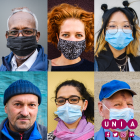Disability
A person with a mental illness wants to live in supervised accommodation but they are forced to remain in an institution for persons with disabilities; a person in a wheelchair has no access to their local town hall because there aren’t any access ramps; an autistic pupil is refused a place in their local school even though reasonable accommodations exist; a visually impaired person isn’t given an office job even though there is adapted computer equipment; etc.
A person with a disability is a person with rights, just like any other person. The United Nations Convention on the Rights of Persons with Disabilities states all these rights.
Even though persons with disabilities represent approximately 15% of the world’s population, they are still faced with many obstacles which prevent them from participating actively and on an equal footing in political, economic, social and cultural life. Disability must be envisaged on the basis of these obstacles, and not simply as a deficiency associated with the person.
What does Unia do?
Unia promotes a social view of disability rather than a medical one. It supports the idea of an inclusive society and opposes discrimination based on:
- anti-discrimination legislation;
- the UN Convention, as an independent mechanism responsible for the promotion, protection and monitoring of its application in Belgium.
As such, Unia:
- advises and supports people who feel discriminated or whose rights, guaranteed by the UN Convention, aren’t respected;
- informs persons with disabilities, and all the stakeholders in society concerned, of the provisions in anti-discrimination legislation (including the notion of reasonable accommodations) and the UN Convention;
- ensures laws and policies comply with the UN Convention and draws up reports and recommendations;
- consults persons with disabilities and their representative associations, especially through its Steering Committee.
Victim or witness
of discrimination?
Find content on Disability
Recent articles Disability
Recent publications Disability
Follow us on:



